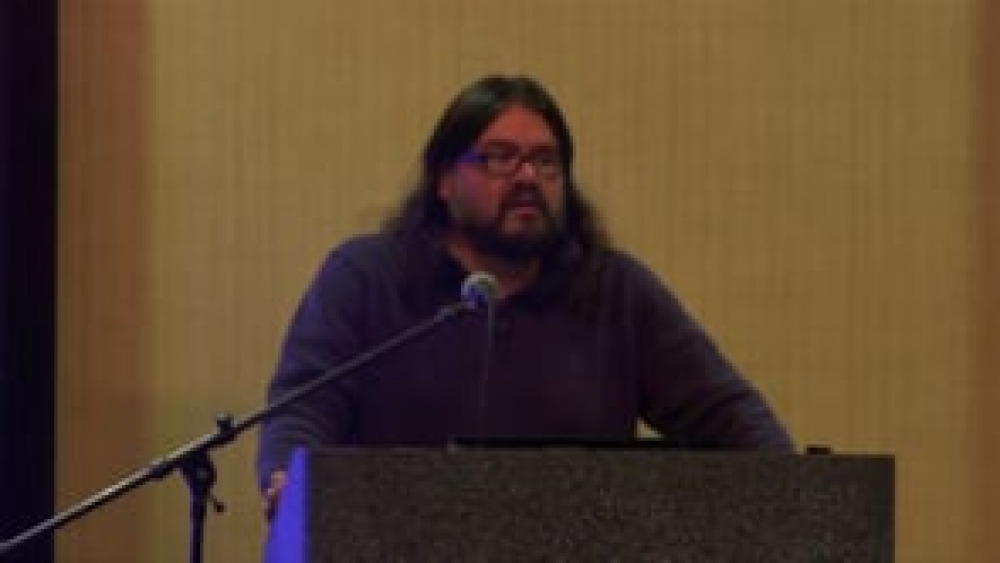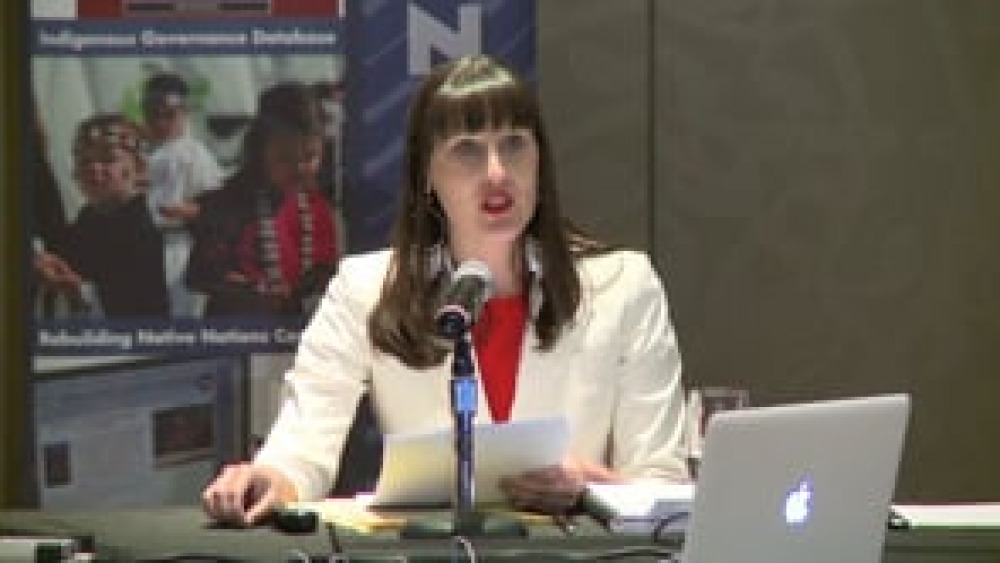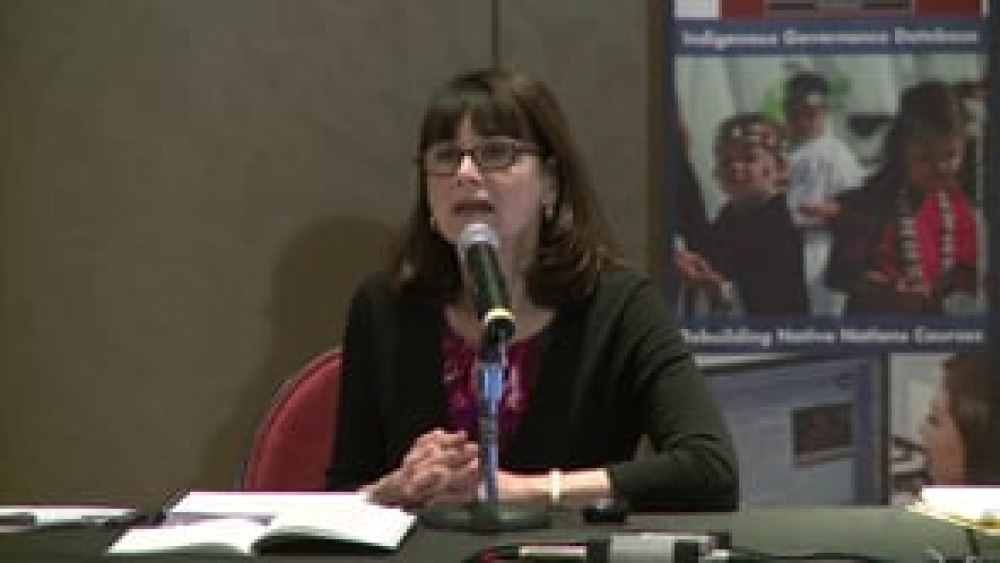Several Native leaders share their thoughts on why their nations are deliberating potential changes to their citizenship criteria, and they discuss some of the many challenges that Native nations face in this complex area of governance.
Additional Information
Beaulieu, Justin. "Constitutions and Constitutional Reform - Day 1 (Q&A)." Tribal Constitutions seminar. Native Nations Institute for Leadership, Management, and Policy, University of Arizona. Tucson, Arizona. April 3, 2013. Q&A session.
Hall, Chris. "Cultivating Constitutional Change at Crow Creek." Native Nations Institute for Leadership, Management, and Policy, The University of Arizona and the Bush Foundation. Spearfish, South Dakota. April 25, 2013. Interview.
Harjo, Suzan Shown. "Five Decades of Fighting for Tribal Sovereignty and Self-Determination." Native Nations Institute for Leadership, Management, and Policy, University of Arizona. Tucson, Arizona. September 11, 2008. Interview.
Hill, Anthony. "Constitutional Reform on the Gila River Indian Community." Tribal Constitutions seminar. Native Nations Institute for Leadership, Management, and Policy, University of Arizona. Tucson, Arizona. April 4, 2013. Presentation.
Wesley, Angela. "Constitutions and Constitutional Reform - Day 2 (Q&A)." Tribal Constitutions seminar. Native Nations Institute for Leadership, Management, and Policy, University of Arizona. Tucson, Arizona. April 4, 2013. Q&A session.
Transcript
Suzan Harjo:
"We have our rights of selecting citizens, setting citizenship criteria saying who we are and who we aren't, who is not part of us. That is an act of sovereignty. Citizenship is an act of sovereignty."
Justin Beaulieu:
"I did a research paper about blood quantum too because it was important to me. And one of the things that I identified was that the only people or the only things that are really identified by how much of something they are is some animals and Native Americans. That’s the only thing. So if we’re going to categorize ourselves into a category with animals because that, it’s always kind of been about resources. The federal government didn’t want to be babysitting a bunch of Indians so they said, ‘We’re going to make, if you have a kid with a white person, they’re half,’ and then eventually we’re going to be extinct before we’re dead. So that was good to them. That was good for them, and if that’s what we want to continue, that’s going to be our legacy, I guess that’s our choice.”
Anthony Hill:
"In our constitution, the blood quantum is in there and I’m sure many of you have blood quantum requirements for your membership. Despite all, there was a great emphasis on changing the blood quantum or addressing the blood quantum, but because we were so busy looking at everything else, at the end of this nearly five-year project we didn’t even touch blood quantum. And that was a great failure on our part because the membership of a community is the most important thing. It is literally the lifeblood of a community and if you can’t decide on who should be in your community, you’re not going to have a community in the future. So that was a failure on our part because we didn’t address that issue because we were so busy addressing the crisis that we, the time we were living in."
Chris Hall:
“I think for me, philosophically, the government is a small supportive entity within a nation. I think the citizenry is the one who outwardly people see as the nation and they should be the ones that are producing. They should be the ones that are exercising that leadership, that autonomy that says that we’re standing on our own two feet. We are capable and we desire our future to be sustainable and we’re not going to give that over to a government institution and we’re not going to give that over to any large umbrella corporation that may or may not support our desires as citizens and define us differently than we choose to be defined. So yeah, it really comes down to the individual’s impetus of making the announcement and the statement, ‘This is who I am, this is what I stand for and this is what I’m willing to do to be a part of this nation.’ And you need people standing beside you that are like-minded.”
Angela Wesley:
"When we do go away and have regular meetings with our people who live away from home, that’s always the question is, 'How is this going to impact me?' It really comes down to the constitution gives us the ability to make decisions for ourselves and like this lady was saying, just because people live, our people have been forced to live away from home doesn’t mean they’re not a part of us anymore. But the way our funding structure was from the Department of Indian Affairs is we were only allowed to spend money for people who were living at home. So that was something that we thought was really critical to us governing ourselves is that we would be able then to earn some wealth with resources that we were getting through treaty and to develop our economy so that we could start to provide services to people who live away from home, whether that be housing, health, education, increased medical services or dental services, that kind of thing but we always said that’s up to us. So many of those things were up to us, and that we had to continue to have those conversations as we built our wealth so that the money is being put to where the people want it to be. In terms of reaching out to people and just talking to them and why we would do that, what they can bring, part of what we wanted to do -- with 85 percent of our people living away from home -- is to start to build that vision in our people that just because you live away from home doesn’t mean that your future generations aren’t going to come back. Like you said, those educated people that are out there that can come with different skills to bring into our community when we start to be able to rebuild our economy so we really wanted not just to make the linkage but also to encourage people to start thinking about coming home. Our vision talks about strengthening our culture, strengthening our language, trying to reincorporate our traditional way of governing ourselves. People have to be home for us to do a lot of those things, so we wanted to start to build that notion in people’s minds that yes, it will be possible. We don’t have schooling right now, we don’t have health care right in our community, but let’s work so that we can so that we can start to attract some of those people to come back home and live comfortably in our territories. That’s part of our vision is that our people are able to live at home. And we recognize that not everybody is going to do that but we want more people to be able to do it."



